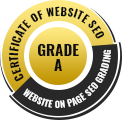Defining websites is more complicated now than ever thanks to the diversification and development of resources and technology. Below is a breakdown of different types of websites you can encounter on the World Wide Web.
E-Commerce Websites
E-Commerce websites are online stores making it convenient to shop from the comfort of your own home. E-commerce websites enable business owners to run and maintain their store from a home or office environment without the need of an expensive shopfront. This type of website also incorporates a checkout cart in order to allow you to purchase directly from the site.
Blogs
Blogs (shortened from web log) came to the mainstream forefront in the early to mid 2000s. This kind of website operates in reverse-chronological order and can either support a second website or stand alone in its own right. Blogging is very popular as it allows a direct and personal interaction with your readers who can provide comments directly on the website.
Personal Websites
Personal websites are generated by individuals for friends and family to share information and pictures with each other. This kind of site has limited use for businesses (even micro businesses) as they are generally not search engine friendly in their setup.
Photo Sharing Websites
These websites have one sole purpose – which is to allow for the uploading and sharing of photographs online. Generally free to use, they have many practical uses particularly for those in the artistic and photographic industry.
Mobile Device Websites
Trying to view full size websites on a mobile can be difficult however there are now websites being created specifically for this purpose. As more and more people are using their phones to surf the internet and view web pages, then the number of these sites will only increase in the future.
Informational Websites
These are identified as sites which strive to provide information on a particular subject or subjects to the reader. Online dictionaries, local councils and real estate companies are examples of informational websites. They provide you with information that you may be seeking as well as further details on how you can contact the company in question if applicable.
Brochure/Catalogue Style Websites
An online brochure based website is more than just for informational purposes as it goes further in depth to provide information about products which are available to purchase. This differs from the traditional e-commerce website as it doesn’t have the checkout facility available online to purchase immediately. A website such as IKEA offers a perfect example as you are able to browse stock online and check availability, however to purchase you must visit your nearest outlet.
Social Media and Networking Websites
These websites are a combination of networking sites such as Facebook and MySpace, although they can also integrate online forums (whether for business or personal use). They are created purely for socialising and discussing topics. Social websites enable one to one connections between individuals.
Therefore before you launch into a redesign of your current business or a new business venture entirely, think about which website may suit your purposes so you can clearly identify your website requirements.


